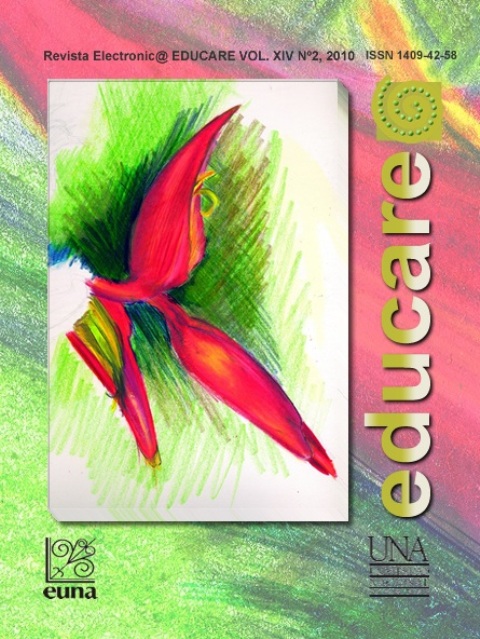The Analogy as a Cognitive Strategy that Encourages Reading Comprehension in Expository Texts
DOI:
https://doi.org/10.15359/ree.14-2.7Keywords:
analogies, reading comprehension, reading strategies, constructivismAbstract
This research arises from the current state of reading in Mexico, because the contextual situation to local and national level has become critical on this issue. Results on standardized tests such as ENLACE (National Assessment of Academic Achievement in Schools) and PISA (Program for International Student Assessment) have shown that Mexican basic level students have text comprehension problems. Given this reality, this is a qualitative descriptive study on the use of analogies in reading as a strategy for reading comprehension, through application of an ethnographic survey, a questionnaire and the application of a pedagogical model for the use of analogies in reading. The study incorporates the theoretical tenets of Constructivism, referring to Piaget (1969), Vygotsky (1997) and Ausubel (2002). The results show that the use of analogies promotes reading comprehension in 4th grade students, from an expository text that compares the evolution of man and the metamorphosis of a butterfly.
References
Ausubel, D. (2002). Adquisición y retención del conocimiento. Una perspectiva cognitiva.
Barcelona: Editorial Paidos.
Chadwick, C. (2001). La psicología del aprendizaje del enfoque constructivista. Revista
Latinoamericana de Estudios Educativos, XXXI(004), 111-126.
González, A. (2004). Estrategias de comprensión lectora. Madrid, España: Editorial Síntesis.
Gutiérrez, V. (2005). La lectura: una capacidad imprescindible de los ciudadanos del siglo XXI. El
caso de México. Anales de documentación, número 008, 91-99.
Instituto Nacional para la Evaluación de la Educación en México [INEE]. (2006). La calidad de
la educación básica en México. (Informe anual 2006). México, D. F: Author.
Instituto Nacional para la Evaluación de la Educación en México [INEE]. (2007). Programa
Internacional para la Evaluación de los Estudiantes [PISA, 2006 ] en México. México, D. F:
Author.
Krippendorff, K. (1990). Metodología del análisis de contenido. Barcelona: Paidós.
Piaget, J. (1969). Psicología y pedagogía. Barcelona: Editorial Ariel.
Sarmiento, C. (1995). Leer y comprender. México: Editorial Planeta.
Smith, F. (1989). Comprensión de la lectura: análisis psicolingüístico de la lectura y su aprendizaje
(2ª ed.). México: Editorial Trillas.
Solé, I. (2001). Estrategias de lectura. México: Editorial Trillas
Vigotsky, L. (1997). Pensamiento y lenguaje. Teoría del desarrollo cultural de las funciones psí-
quicas (2ª ed.). México: Ediciones quinto sol.
Downloads
Published
How to Cite
Issue
Section
License
1. In case the submitted paper is accepted for publication, the author(s) FREELY, COSTLESS, EXCLUSIVELY AND FOR AN INDEFINITE TERM transfer copyrights and patrimonial rights to Universidad Nacional (UNA, Costa Rica). For more details check the Originality Statement and Copyright Transfer Agreement
2. REUTILIZATION RIGHTS: UNA authorizes authors to use, for any purpose (among them selfarchiving or autoarchiving) and to publish in the Internet in any electronic site, the paper´'s final version, both approved and published (post print), as long as it is done with a non commercial purpose, does not generate derivates without previous consentment and recognizes both publisher's name and authorship.
3. The submission and possible publication of the paper in the Educare Electronic Journal is ruled by the Journal’s editorial policies, the institutional rules of Universidad Nacional and the laws of the Republic of Costa Rica. Additionally, any possible difference of opinion or future dispute shall be settled in accordance with the mechanisms of Alternative Dispute Resolution and the Costa Rican Jurisdiction.
4. In all cases, it is understood that the opinions issued are those of the authors and do not necessarily reflect the position and opinion of Educare, CIDE or Universidad Nacional, Costa Rica. It is also understood that, in the exercise of academic freedom, the authors have carried out a rogorous scientific-academic process of research, reflection and argumentation thar lays within the thematic scope of interest of the Journal.
5. The papers published by Educare Electronic Journal use a Creative Commons License:















 The articles published by Educare Electronic Journal can be shared with a Creative Commons License:
The articles published by Educare Electronic Journal can be shared with a Creative Commons License: 



